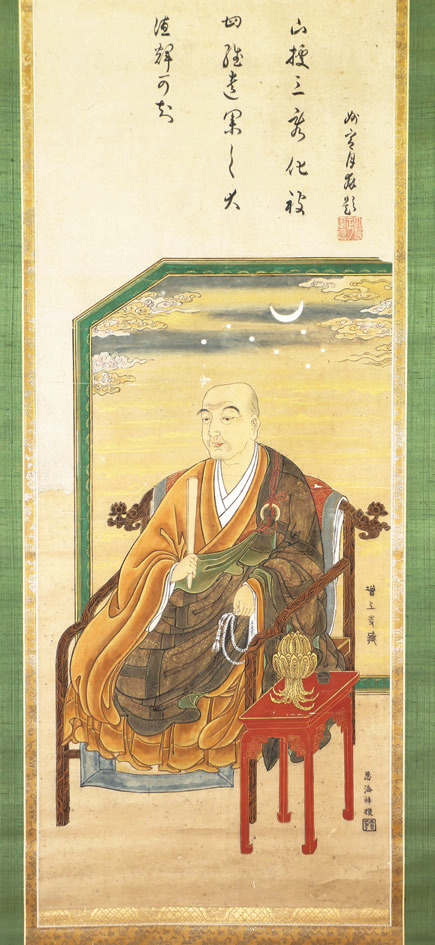Shōgei on:
[Wikipedia]
[Google]
[Amazon]
 Shōgei (聖冏, October 15, 1341 - September 27, 1420) was a Buddhist monk from the middle of the
Shōgei (聖冏, October 15, 1341 - September 27, 1420) was a Buddhist monk from the middle of the
 Shōgei (聖冏, October 15, 1341 - September 27, 1420) was a Buddhist monk from the middle of the
Shōgei (聖冏, October 15, 1341 - September 27, 1420) was a Buddhist monk from the middle of the Muromachi period
The , also known as the , is a division of Japanese history running from approximately 1336 to 1573. The period marks the governance of the Muromachi or Ashikaga shogunate ( or ), which was officially established in 1338 by the first Muromachi ...
. He is the considered the seventh founder of Jōdo-shū
Jōdo-shū (浄土宗, "The Pure Land School"), is a Japanese branch of Pure Land Buddhism derived from the teachings of the Kamakura era monk Hōnen (1133–1212). The school is traditionally considered as having been established in 1175 and i ...
( Chinzei-ha).
He was a native of Hitachi Province
was an old provinces of Japan, old province of Japan in the area of Ibaraki Prefecture.Louis Frédéric, Nussbaum, Louis-Frédéric. (2005). "''Hitachi fudoki''" in . It was sometimes called . Hitachi Province bordered on Shimōsa Province, S ...
and the Shiio clan. He entered the priesthood under Ryoji at Uriren Jofukuji Temple and studied under Rensho at Ota Honen-ji Temple in the same province. He studied a wide range of Buddhism, primarily Pure Land Buddhism
Pure Land Buddhism or the Pure Land School ( zh, c=淨土宗, p=Jìngtǔzōng) is a broad branch of Mahayana, Mahayana Buddhism focused on achieving rebirth in a Pure land, Pure Land. It is one of the most widely practiced traditions of East Asi ...
, but also Tendai
, also known as the Tendai Dharma Flower School (天台法華宗, ''Tendai hokke shū,'' sometimes just ''Hokkeshū''), is a Mahāyāna Buddhist tradition with significant esoteric elements that was officially established in Japan in 806 by t ...
, Esoteric Buddhism
''Vajrayāna'' (; 'vajra vehicle'), also known as Mantrayāna ('mantra vehicle'), Guhyamantrayāna ('secret mantra vehicle'), Tantrayāna ('tantra vehicle'), Tantric Buddhism, and Esoteric Buddhism, is a Mahāyāna Buddhism, Mahāyāna Buddhis ...
, Zen
Zen (; from Chinese: ''Chán''; in Korean: ''Sŏn'', and Vietnamese: ''Thiền'') is a Mahayana Buddhist tradition that developed in China during the Tang dynasty by blending Indian Mahayana Buddhism, particularly Yogacara and Madhyamaka phil ...
, and Kusha
Kusha () is a Chandravamsha king in Hindu mythology. He was the father of Kushanabha
Kushanabha () is a king featured in Hindu texts. He is described to be the king of the Amavasu dynasty and belongs to the Chandravamsha line. He is stated to ...
. He established rituals for transmission of the Dharma
Dharma (; , ) is a key concept in various Indian religions. The term ''dharma'' does not have a single, clear Untranslatability, translation and conveys a multifaceted idea. Etymologically, it comes from the Sanskrit ''dhr-'', meaning ''to hold ...
for the training of Jōdo-sect followers, formally establishing Jōdo-shū as an independent sect from Tendai. He was also well-versed in Shinto
, also called Shintoism, is a religion originating in Japan. Classified as an East Asian religions, East Asian religion by Religious studies, scholars of religion, it is often regarded by its practitioners as Japan's indigenous religion and as ...
, Confucianism
Confucianism, also known as Ruism or Ru classicism, is a system of thought and behavior originating in ancient China, and is variously described as a tradition, philosophy, Religious Confucianism, religion, theory of government, or way of li ...
, and Japanese poetry
Japanese poetry is poetry typical of Japan, or written, spoken, or chanted in the Japanese language, which includes Old Japanese, Early Middle Japanese, Late Middle Japanese, and Modern Japanese, as well as poetry in Japan which was written in th ...
.
His disciples included Seisō and Ryōchi, and together with Seisō, who became the eighth patriarch of the sect, he is regarded as the leader who promoted the Jōdo sect's Chinzeigyō from a doctrinal and academic perspective. He is also known for founding the Edo
Edo (), also romanized as Jedo, Yedo or Yeddo, is the former name of Tokyo.
Edo, formerly a (castle town) centered on Edo Castle located in Musashi Province, became the '' de facto'' capital of Japan from 1603 as the seat of the Tokugawa shogu ...
Koishikawa
is a district of Bunkyo, Tokyo. It consists of five sub-areas, . In Koishikawa are located two well regarded gardens: the Koishikawa Botanical Garden (operated by the University of Tokyo) in Hakusan, and the Koishikawa Korakuen Garden in Kōr ...
Denzu-in Temple.
References
{{DEFAULTSORT:Shogei Jōdo-shū Buddhist priests Japanese Buddhist clergy 1341 births 1420 deaths